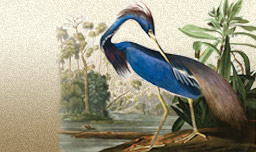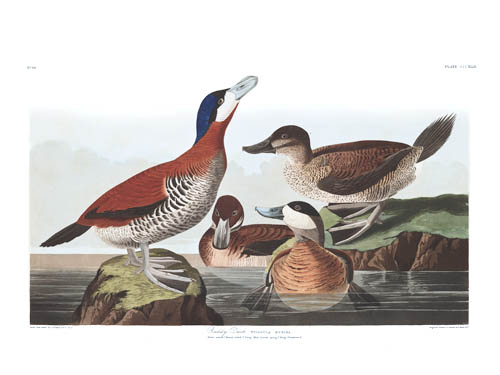|
||||||||||||||||||||
|
||||||||||||||||||||
|
|
||||||||||||||||||||
|
Ornithological Biography Look at this plate, reader, and tell me whether you ever saw a greater difference between young and old, or between male and female, than is apparent here. You see a fine old male in the livery of the breeding season, put on as it were expressly for the purpose of pleasing the female for awhile. The female has never been figured before; nor, I believe, has any representation been given of the young in the autumnal plumage. Besides these, you have here the young male at the approach of spring. The Ruddy Duck is by no means a rare species in the United States; indeed I consider it quite abundant, especially during the winter months in the Peninsula of Florida, where I have shot upwards of forty in one morning. In our Eastern Districts they make their appearance early in September, and are then plentiful from Eastport to Boston, in the markets of which, as well as of New York, I have seen them. On the Ohio and Mississippi they arrive about the same period; and I have no doubt that they will be found breeding in all our Western Territories, as soon as attention is paid to such matters as the searching for nests with the view of promoting science, or of domesticating birds which might prove advantageous to the husbandman. My friend Dr. BACHMAN informs me that this species is becoming more abundant every winter in South Carolina. In the month of February he has seen a space of the extent of an acre covered with it. Yet he has never found one in still summer plumage in that country. It is equally fond of salt or brackish and of fresh waters; and thus we find it at times on our seacoast, bays, and mouths of rivers, as well as on lakes and even small ponds in the interior, or on our salt marshes, provided they are not surrounded by trees, as it cannot rise high in the air unless in an open space of considerable extent. At the time of their arrival, they are seen in small flocks, more than from seven to ten being seldom found together, until they reach the Southern States, where they congregate in great flocks. When they leave their northern breeding-grounds, some proceed along the coast, but a greater number along our numerous rivers. The flight of the Ruddy Duck is rapid, with a whirring sound, occasioned by the concave form of the wings and their somewhat broad ends, the whistling sound produced by other species having more pointed and stiffer quills, not being heard in this, or only in a very slight degree. They rise from the water with considerable difficulty, being obliged to assist themselves with their broad webbed feet, and to run as it were on the surface for several yards, always against the breeze, when it blows smartly. The strength of the muscles of their feet enables them to spring from the ground at once. When they are fairly on wing, they fly in the same manner as most of our travelling Ducks, sustain themselves with ease, and are apt to remove to great distances. They alight on the water more heavily than most others that are not equally flattened and short in the body; but they move on that element with ease and grace, swimming deeply immersed, and procuring their food altogether by diving, at which they are extremely expert. They are generally disposed to keep under the lee of shores on all occasions. When swimming without suspicion of danger, they carry the tail elevated almost perpendicularly, and float lightly on the water; but as soon as they are alarmed, they immediately sink deeper, in the manner of the Anhinga, Grebes, and Cormorants, sometimes going out of sight without leaving a ripple on the water. On small ponds they often dive and conceal themselves among the grass along the shore, rather than attempt to escape by flying, to accomplish which with certainty they would require a large open space. I saw this very often when on the plantation of General HERNANDEZ in East Florida. If wounded, they dived and hid in the grass; but, as the ponds there were shallow, and had the bottom rather firm, I often waded out and pursued them. Then it was that I saw the curious manner in which they used their tail when swimming, employing it now as a rudder, and again with a vertical motion; the wings being also slightly opened, and brought into action as well as the feet. They are by no means shy, for I have often waded toward them with my gun until very near them, when I cared not about shooting them, but was on the look-out for a new Rail or Gallinule, along the margin of the ponds. They are often seen in company with Teals, Scaup Ducks, Gadwalls, Shovellers, and Mallards, with all of which they seem to agree. My opinion that the males of this species lose the brightness of their spring dress before they return to us in autumn, is founded on the occurrence of multitudes of males at that season destitute of the garb in question, and my examination of many for the purpose of determining their sex and ascertaining that they were old birds. In February 1832, I saw immense flocks of Ruddy Ducks about a hundred miles up the St. John’s in Florida. They would start from the water, as our schooner advanced under sail, patting it with their feet, so as to make a curious and rather loud noise, somewhat resembling the fall of hail-stones on the shingles. Their notes are uttered in a rather low tone and very closely resemble those of the female Mallard. They afford good eating when fat and young, and especially when they have been feeding for some weeks on fresh waters, where their food generally consists of the roots and blades of such grasses is spring from the bottom of rivers and ponds, as well as of the seeds of many gramineae. When on salt marshes, they eat small univalve shells, fiddlers, and young crabs, and on the sea-coast, they devour fry of various sorts. Along with their food, they swallow great quantities of sand or gravel. At St. Augustine, in Florida, I shot a young bird of this species immediately under the walls of the fort. Although wounded severely and with one of its legs broken close to the body, it dived at once. My Newfoundland do, leaped into the water, and on reaching the spot where the bird had disappeared, dived also, and in a few moments came up with the poor thing in his mouth. When the dog approached I observed that the Duck had seized his nose with its bill; and Ashen I laid bold of it, it tried to bite me also. I have found this species hard to kill, and when wounded very tenacious of life, swimming and diving at times to the last gasp |
||||||||||||||||||||
|
|
||||||||||||||||||||


| Home | Gallery | Audubon Biography | About Edition | Testimonials | Authorized Dealers | Links | Contact Us |

© Copyright 2007-2025 Zebra Publishing, LLC. | All Rights Reserved Terms of Use
Powered by Fusedog Media Group
